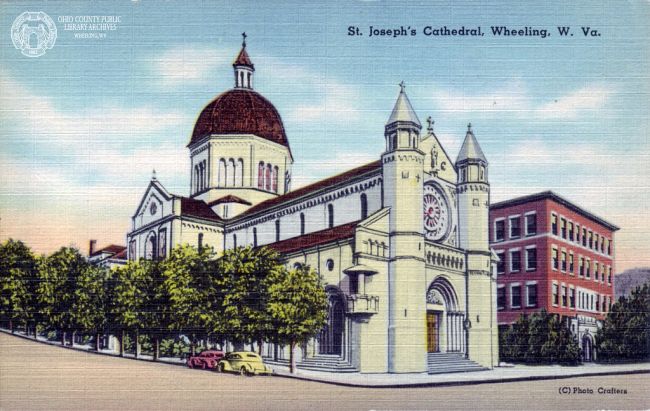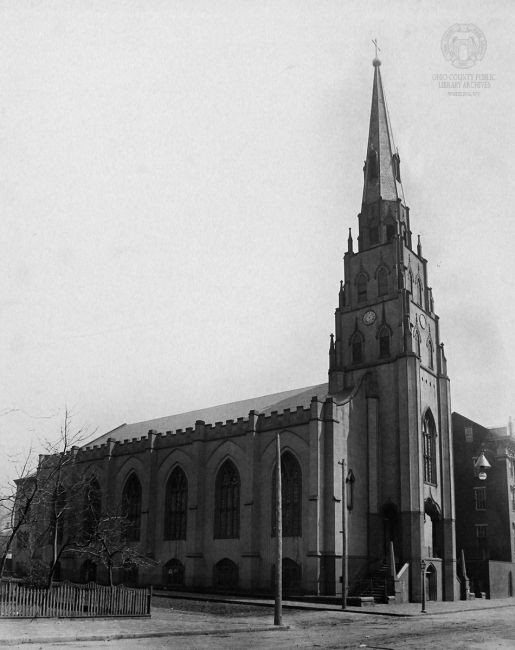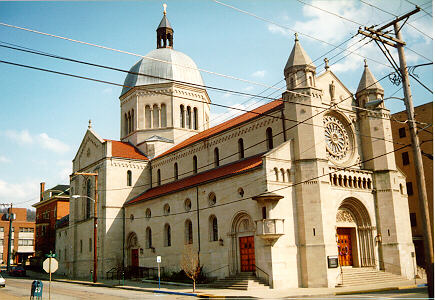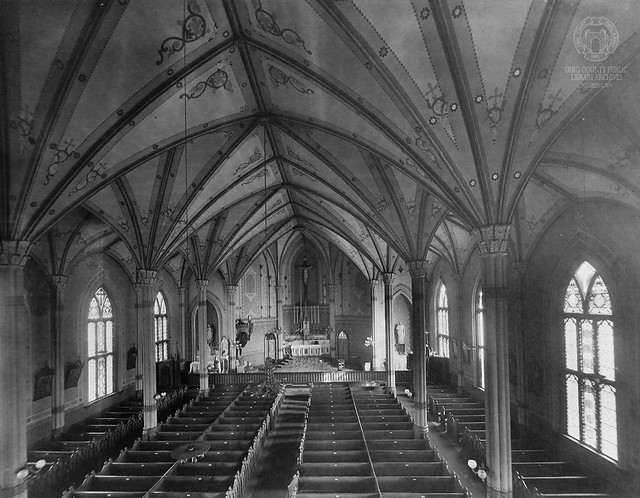St. Joseph's Cathedral
 Located on the southeast corner of 13th and Eoff Streets, St. Joseph Cathedral was built between 1923 and 1926, under the able leadership of Most Reverend John James Swint, the fourth Bishop of the Diocese of Wheeling-Charleston. Swint oversaw the construction of so many churches, schools, and hospitals during his service as Bishop that he earned the nickname “God’s Bricklayer.” This occurred during a nationwide period of infrastructure expansion in the Church known as “brick and mortar Catholicism.”
Located on the southeast corner of 13th and Eoff Streets, St. Joseph Cathedral was built between 1923 and 1926, under the able leadership of Most Reverend John James Swint, the fourth Bishop of the Diocese of Wheeling-Charleston. Swint oversaw the construction of so many churches, schools, and hospitals during his service as Bishop that he earned the nickname “God’s Bricklayer.” This occurred during a nationwide period of infrastructure expansion in the Church known as “brick and mortar Catholicism.”
The new Lombard Romanesque style cathedral, which replaced the older cathedral on the same site, was designed by Pittsburgh architect Edward J. Weber. Constructed with Indiana Limestone, it remains one of the largest churches in the state.
Design inspiration came from the church of San Pietro in Toscanella and the cathedral in Prato, near Florence, Italy. Bishop Swint wanted the dome to be based on the dome of the cathedral of Santa Maria del Fiore in Florence. The sculpture “Christ in Majesty” near the main doorway was carved by Francis Aretz, who also sculpted the Stations of the Cross. According to the architect, the colorful interior of St. Joseph was created in the Mediaeval Byzantine style. The primary dome is filled with a depiction of heaven. The eye-catching mural, “Enthroned Christ and the Communion of the Saints,” which fills the half-dome of the apse, was painted by Felix B. Lieftuchter, and George W. Sotter designed the medieval-style stained glass.
In 1973, changes were made to the interior in keeping with Vatican II standards, and in 1995-1996, the cathedral was restored and cleaned, including the murals and stained glass. A new pulpit, altar, lectern and font designed by Tracy R. Stephens were added.
 A stone column from the original cathedral found during the renovations was placed in the courtyard to the south of the building. The cornerstone for that original cathedral, St. James, was laid in May 1847 during the tenure of Bishop Richard V. Whelan (1809-1874), who is regarded as the founder of the Diocese. The parish, at the time, was primarily composed of Irish and German immigrants.
A stone column from the original cathedral found during the renovations was placed in the courtyard to the south of the building. The cornerstone for that original cathedral, St. James, was laid in May 1847 during the tenure of Bishop Richard V. Whelan (1809-1874), who is regarded as the founder of the Diocese. The parish, at the time, was primarily composed of Irish and German immigrants.
According to legend, Bishop Whelan himself climbed the scaffolding to place the cross on the top of the church’s 200-foot spire after workmen complained that the job was too dangerous.
According to another legend, Bishop Whelan called upon the Irish men of the parish to surround the cathedral and residence to defend a papal delegate when he was threatened by an anti-Catholic Know Nothing mob during an 1853 visit.
Bishop Whelan also brought the Visitation Nuns (Mt. de Chantal School) to Wheeling and was one of the founders of Wheeling Hospital.
The original cathedral was renamed for St. Joseph at Whelan’s request in 1872. When Bishop Whelan died in 1874, West Virginia’s Catholic population had quadrupled since the Diocese was founded in 1850.
 By 1922 when Bishop Swint had assumed office, the old cathedral was badly deteriorating. The old structure was razed and a temporary chapel constructed. The cornerstone for the new building was blessed on May 5, 1924. The new St. Joseph Cathedral was consecrated on April 21, 1926.
By 1922 when Bishop Swint had assumed office, the old cathedral was badly deteriorating. The old structure was razed and a temporary chapel constructed. The cornerstone for the new building was blessed on May 5, 1924. The new St. Joseph Cathedral was consecrated on April 21, 1926.
Extensive renovations and restorations to repair the cathedral’s interior finishes were completed in the 1990s.
Location
▶ 1300 Eoff Street
Images

360 Degree Interior View (Click and drag image)
(Courtesy Andy Johanson, Google Photo Sphere)
Notes
- No notes at this time -- we are updating. Check back soon.
Additional Resources
Library resources:
▶ "The architecture, art and artifacts of Saint Joseph Cathedral," Dorsch, Larry W., 2000
▶ "Saint Joseph's Cathedral, Wheeling, W.Va. : souvenir," 1926

